Archived Commercial Blog Posts
Commercial Systems Prone to Water Damage: SERVPRO of Cherokee County
4/28/2022 (Permalink)
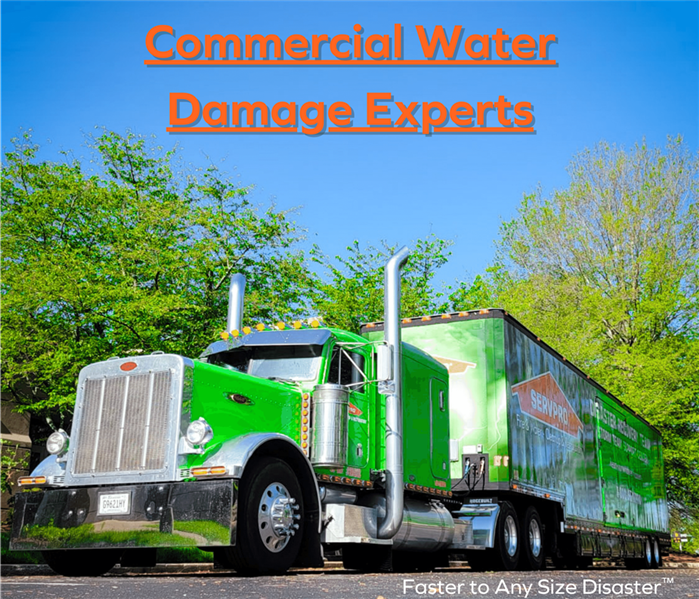 SERVPRO of Cherokee County is ready for whatever happens! We'll restore your business after any size of property damage.
SERVPRO of Cherokee County is ready for whatever happens! We'll restore your business after any size of property damage.
Commercial properties present unique risks when it comes to water damage in Canton, GA. Unlike residential homes, which are usually one story and have easily accessible crawl spaces and attics, commercial buildings can be many stories high with flat roofs and multiple storefront windows. They also often have expensive specialized equipment that can be very costly to repair or replace if damaged by water. In this blog post, we will discuss the different parts of a commercial building that are at risk for water damage, as well as some tips on how to prevent it.
Plumbing Systems
The first and most obvious risk for water damage in a commercial property is the plumbing system. Because commercial buildings have more bathrooms, kitchens, and other water-using fixtures, they also have larger and more complex plumbing systems. These systems are often located in hard-to-reach places, making them difficult to repair if they spring a leak.
One of the main water damage challenges according to The Hartford Insurance is an improperly maintained sprinkler system. By law, most commercial buildings must have a fire sprinkler system, but many building owners forget to regularly maintain and test these systems. While a well-maintained fire sprinkler system can help prevent extensive fire damage in the event of a fire, improper maintenance or disaster planning can cause extensive water damage that can flood multiple floors.
Another plumbing risk is burst pipes. Commercial buildings, especially high rises tend to run at a higher pressure than residential buildings. Therefore, a burst pipe has the potential to release significantly more water than a home.
One of the ways in which we help commercial property owners prevent catastrophic property damage before it happens is through our app-based Emergency Response Planning program (ERP).
Roofing Systems
In addition to the plumbing system, there are a number of exterior commercial building components that can experience water damage. One of the most common is the flat roof. Because flat roofs are not sloped like traditional pitched roofs, they tend to pool water instead of shedding it. This can lead to leaks and eventually, if left unaddressed, major water damage.
Some common commercial roofing systems include:
- Built-up Roofing (BUR): Often called tar and gravel roofs, these commercial roofing systems are built with a semi-continuous membrane installed in layers, then covered in aggregate. While they are usually simple to maintain, best practices suggest inspecting the roof for deterioration and possible leak points at least twice yearly.
- Thermoplastic Single-Ply Membrane Roofing (PVC & TPO): These roofs are installed in large rolls that are then welded together at the seams with heat. The material is very durable and oil-resistant. However, the heat-welding methods require skilled installation, which can lead to weak points and leak-prone areas if not performed correctly.
- EPDM Roofing: Some roofers call these "rubber roofs" because the material they are made of, ethylene propylene diene monomer is very rubber-like. This kind of roof is derived from oil and natural gas, and appears dark gray or black. When installed correctly and with the highest thickness available, this type of commercial roof will last a very long time with little to no issues. Unless you experience storm damage in your area, an annual check for leaks around the roof penetrations should suffice.
Window Systems
Commercial window systems are built for durability and use, however, they can often present a unique water damage challenge for commercial facilities. Most aluminum glazing systems aren't intended to be 100% waterproof. Most commercial window systems are meant to limit water penetration during extreme circumstances while also weeping water back out to the exterior.
By directing all moisture to the sill flashing, storefront systems limit water penetration. It's critical that the sill flashing be installed correctly in order to avoid water damage. Making sure that sealant is put on the top of the rear leg before installing the sill is one of the most important aspects of a good installation.
The most essential aspect of maintaining water penetration with a storefront is end dam fastening and sealing. Water will enter the building through the jamb locations if end dams are not properly fastened and sealed. Improperly (or missing) end dams can cause significant water damage to the interior drywall or flooring around commercial storefront windows.
Like anything else in a building, time and the elements can cause wear and tear and failure of these commercial window water control systems.
Commercial Water Damage Inspection Services
So if you notice moisture or water damage around your storefront windows, you should consider calling SERVPRO of Cherokee County to inspect for potential water damage issues. Our technicians are trained to identify, troubleshoot, and restore all types of commercial water issues.
Call today to schedule your commercial service!
(770) 924-3848
Fire Risk In Your Commercial Office? Try These Tips
1/20/2022 (Permalink)
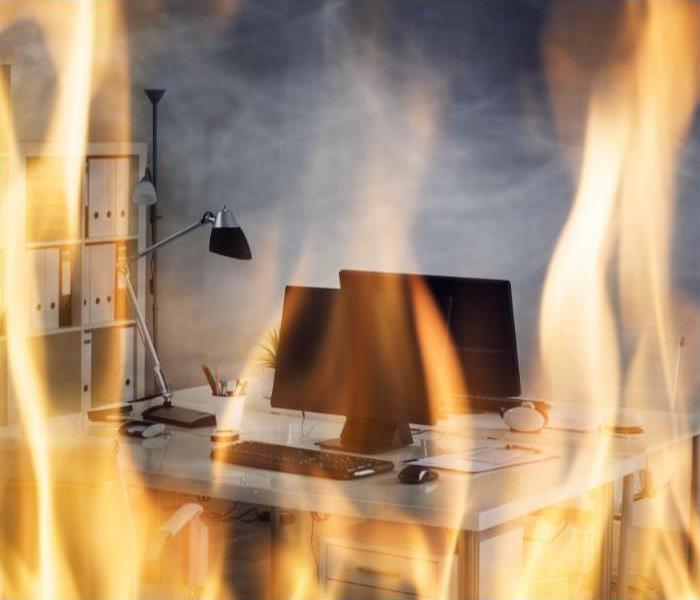 Office Fire
Office Fire
Our homes and our businesses in Towne Lake, GA or Holly Springs, GA are our castles, which is why we work hard to make them as safe and secure as possible. Unfortunately, there are some hazards that may not be obvious and can cause damage to your office, in the form of fire or water damage. Even more unfortunate? The cost of these damages, which could run into the thousands of dollars, and can come out of your pocket—whether you’re an individual homeowner or a business owner or landlord. Here are some common causes of fire and water damage in commercial office buildings, as well as tips on how to prevent them from occurring and damaging your home or commercial property.
Understanding Building Fire Damage
Most office building fires are small. But even a small fire can do a lot of damage if it gets out of control or isn’t contained early on. One of the biggest dangers is smoke and fire damage to your home or commercial office's interiors. Smoke can permeate materials, carpets, walls, flooring, ceilings—even drywall joints—leaving hidden danger behind long after flames have been extinguished. Even if you can’t see any visible signs of fire or smoke damage, you should always have an experienced professional examine your property for lingering toxins from before you move back in.
According to this report by the NFPA, there are 7 main causes of fires in commercial office buildings. Cooking Equipment, Electrical distribution and lighting equipment, heating equipment, intentional damage, smoking materials, exposure to other fire sources, and electronic, office, or entertainment equipment. This statistic includes general business offices, banks, veterinary or research offices, engineering, mailing firms, and post offices.
Common Causes of Commercial Building Fires
Most office fires are caused by cooking equipment, accounting for slightly over one in every four commercial office fires. However, while these fires are the most common, they do not account for most of the property damage to office buildings. That position is taken by the intentional damage category. Intentional damage alone accounts for a full 20% of commercial fire property damage. Intentional Property Damage occurs when a person seeks to purposely damage the office property through arson.
Two other leading causes of fire in office buildings are heating equipment, electrical distribution, and lighting equipment. Together, they account for 18% of property damage to commercial office buildings. These can include things such as space heaters, light fixtures, electrical wiring, outlets, electrical appliances, extension cords, and more.
While lower on the list, smoking materials, electronic, office, or entertainment equipment account for 12% of commercial office property damage.
Lastly, exposure fires, as defined by the National Fire Incident Reporting System (NFIRS), are fires resulting from another fire outside of the commercial building itself. This kind of commercial fire damage accounted for 18% of property loss.
What Can I Do To Prevent A Building Fire?
If your building was constructed with modern building materials, fire damage should be a rare occurrence. But it can still happen if you’re not careful. Make sure all smoking materials are safely extinguished before leaving work each day. A smoldering cigarette can ignite more easily than you think. Also, make sure to regularly inspect your smoke alarms, carbon monoxide detectors, and fire suppression systems to ensure they’re working properly. If a smoke alarm goes off for no reason at all, make sure to replace or recharge its batteries immediately.
The NFPA uncovered another intriguing statistic about fires on weekends and between the nighttime hours of 7 pm and 7 am. 19% of fires occurred on weekends but accounted for 31% of fire-related property losses. Meanwhile, fires at night accounted for less than one-third of office property fires, yet caused 67% of direct property damage due to fires.
Automatic Fire Detection & Fire Extinguishing Systems: This shows that one of the most important steps you can take towards protecting your office building from fire damage is to install and maintain automatic detection and fire extinguishing systems.
Camera monitoring systems such as those installed by videosurveillance.com or Pelco would be best for large-scale commercial properties. Otherwise, self-installed solutions such as those recommended in this article by PC Mag will work well.
For fire suppression systems, the best solution is to pay a proper fire protection services consultant such as Fire Protection Services LLC. Make sure to ask them to help you develop and implement a fire suppression system maintenance plan.
Cooking Equipment Fire Prevention: The best way to prevent fires with cooking equipment is to train your staff properly in its use, cleaning, and maintenance. For more on cooking equipment fire prevention, be sure to refer to our article called Reduce Fire Risk in Your Commercial Kitchen with These Quick Tips.
Electrical Hazards Fire Prevention: When it comes to electrical distribution and lighting equipment, there is a multitude of reasons why fire may start. But according to this article by firerescue1.com, faulty outlets or appliances, light fixtures, extension cords, space heaters, and wiring issues were the 5 most common electrical fire causes.
To prevent faulty outlet or wiring fire hazards, the first step is to make sure to have a certified electrical contractor or property inspector review your commercial property before purchase. Even if you or a tenant are already occupying your commercial office space, a proper inspection by a certified electrical contractor to ensure code compliance of all building materials and installations will protect you from potentially expensive fire repairs. This is especially important to protect you from having to pay for potential property damages out of pocket.
To protect your commercial property from fire damage due to light fixtures or extension cords, the most important tip is to ensure you follow the manufacturer's maximum recommended wattage and amperage guidance.
A good rule of thumb for selecting an extension cord is the smaller the wire gauge rating, the greater the capacity. According to this article by the Spruce, 12-gauge extension cords can handle up to 1920 watts (16 Amps), 14-gauge cords can handle 1440 watts (12 Amps), 16-gauge can handle 840 Watts (7 Amps), and 18-gauge cords 600 Watts (5 Amps). In addition to wattage capacities, another thing you should look at when choosing a commercial electrical power solution is cord lengths. The longer the cord, the more important it becomes to have a higher wattage extension cord.
For light fixtures, you should follow manufacturer guidelines to prevent property fire damage. However, what you should look out for are potentially dangerous light bulb wattages and materials around your lighting fixtures that could catch fire. High-wattage incandescent bulbs installed on light fixtures that are rated for lower-wattage bulbs can spark flames because of overheating. Also, keeping flammable materials around light fixtures, or allowing dust buildup increases the risk for fire damage.
Call SERVPRO of Cherokee County to Restore Commercial Fire Damage
We hope these tips are useful to help you protect your commercial property from fire damage. In case you experience a property loss in your commercial office building or commercial property, our team at SERVPRO of Cherokee County is available to help 24/7/365. Call us today at 770-924-3848 for rapid assistance.
Reduce Fire Risk in Your Commercial Kitchen with These Quick Tips
12/23/2021 (Permalink)
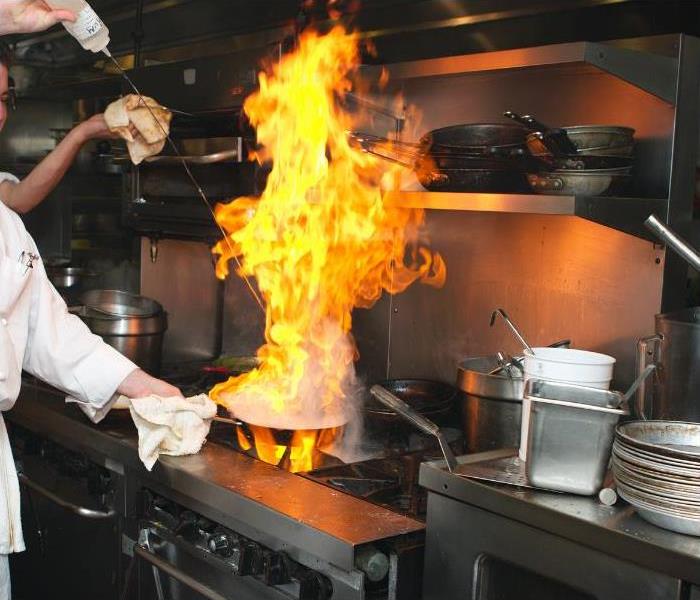 Commercial Kitchen Fire While Cooking
Commercial Kitchen Fire While Cooking
If you own a restaurant, bar or commercial kitchen in Canton, GA or Lathemtown, GA, reducing fire risk is critical to continued profitable operation. The National Fire Protection Association (NFPA) reports that fire departments responded to over 7,410 structure fires in the kitchen of restaurants and bars in 2017 alone. Most of these fires were preventable, resulting in three deaths, 110 injuries, and $165 million in property damage annually in commercial kitchens. These tips will help keep you and your staff safe while preventing shutdowns due to fire code violations.
What Are My Ducting and Air Movement Requirements to Prevent Fire?
While Chapter 7 of the NFPA 96 Standard for Ventilation Control and Fire Protection of Commercial Cooking Operations covers this extensively, here are a few key items to keep in mind.
First, commercial kitchen ducts should never pass-through firewalls, share an exhaust system with the building ventilation, or have obstructed access panels. While doing these things on a commercial kitchen remodel can save costs in the short term, the fire risk increases significantly. If disregarded, your commercial kitchen work will likely not pass inspection.
Make sure to maintain a minimum clearance of 18 inches between combustible materials and the kitchen ducts. This standard is based on Section 4.2 of the NFPA 96, however is one of the easiest to disregard once the kitchen is operational. Ducts can build up high levels of radiant heat that can ignite combustible materials like boxes, cups, plates, utensils, or other kitchen materials.
If you would like additional information on the types of combustible and non-combustible materials that should and shouldn't be kept near the duct, consult Chapter 3 of the NFPA.
What Are My Commercial Kitchen Fire Extinguisher Requirements?
"The NFPA 96 requires automated fire suppression equipment for all grease removal devices, hood exhaust plenums, and exhaust duct systems in a commercial kitchen, as well as any cooking equipment that produces grease-laden vapors." - Koorsen Fire & Security
The NFPA 96 requires use of class K fire extinguishers in conjunction with automatic fire extinguishing systems. These extinguishers also require installed placards stating their extinguisher class. However, in the case of a commercial kitchen fire, it's critical to activate the automatic fire extinguisher system before using portable-type extinguishers. This is because high-efficiency cooking appliances in many modern commercial kitchens are capable of achieving high temperatures that can raise the vegetable oils to intensely high temperatures. When oil ignites at these high temperatures, it can already be so hot that a portable extinguisher is not enough to stop the flames.
Another standard that you should familiarize yourself with is the UL 300 standard.
According to this article by Insureon, a kitchen’s cooking equipment must meet these UL 300 requirements:
- Fire-extinguishing nozzles in the hood, ducts, and above each cooking appliance
- An automatic fuel shut-off capabilities for both gas and electric power sources
- A manual fuel shut-off pull for all power sources
- A wet-chemical fire-extinguishing system that meets UL 300 criteria (one of which is undergoing semiannual checkups by a certified professional)
If you need immediate assistance after a fire, our teams are available 24/7/365. With our promise of being Faster to Any Size Disaster, you can count on SERVPRO of Cherokee County to be there when it counts. Call us today at (770) 924-3848 for rapid assistance.
The Best Cleaning Methods for Water-Damaged Contents
12/16/2021 (Permalink)
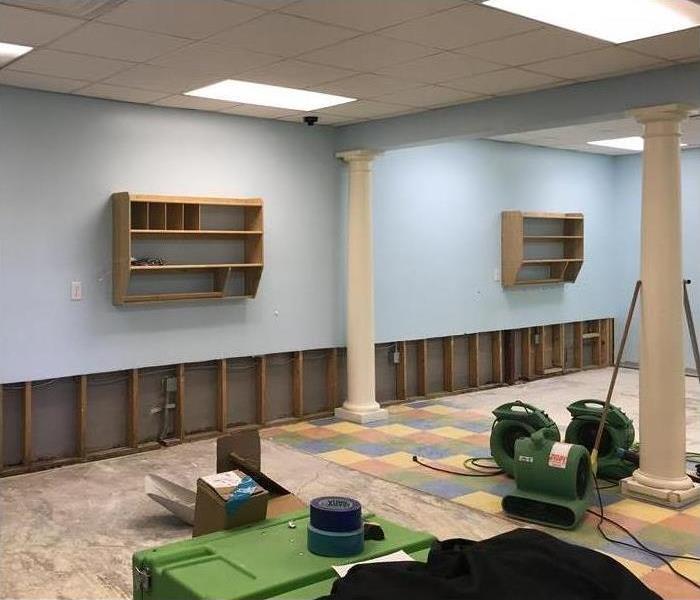 Water damage cleanup in Waleska, GA.
Water damage cleanup in Waleska, GA.
The Best Water-Damaged Content Cleaning Methods
A variety of restoration methods can be effective for contents with water damage. A mitigation service will recommend the best options for cleaning the contents of a flooded company. Find out more about how experts treat different types of items.
Delicate Contents
Delicate contents may require more or less extensive cleaning depending on the category of water damage. Contents exposed to
• Category One clean water should be air dried
• Category Two gray water should be cleaned, disinfected, and dried
• Category Three black water should be cleaned, disinfected, and dried
Some delicate materials may not stand up to disinfection and should be disposed of and replaced. Other items may benefit from dry cleaning, foam, immersion, or spraying and wiping.
Stained Contents
Stained contents may require intensive methods. Depending on the durability and porosity of items, treatments may include
• Foam
• Immersion
• Spraying and wiping
• Ultrasonic waves
• Wet cleaning
These methods can remove stains from many types of contents in a flooded company. Factor in the materials, category of water damage, and cause of staining when selecting a cleaning method.
Non-Porous Contents
Hard, non-porous contents can be good candidates for several cleaning techniques. Damage cleanup experts may recommend abrasion, immersion, treatment with ultrasonic waves, or wet cleaning. The delicacy of items should be taken into consideration when determining the best cleaning method.
Porous Contents
Allow porous items or materials exposed to clean water from a broken pipe to air dry. It may be possible to speed drying by using air movers, dehumidifiers, or fans. Porous contents exposed to contaminated water may need to be thrown away and replaced. These items can pose a recontamination risk.
The owner of a building or flooded company should inquire about content cleaning methods. Most of these treatments call for specialized training and professional equipment or treatment facilities. Rely on a damage restoration firm located in Waleska, GA.
Tips to Upgrade Your Commercial Cleaning Systems
11/9/2021 (Permalink)
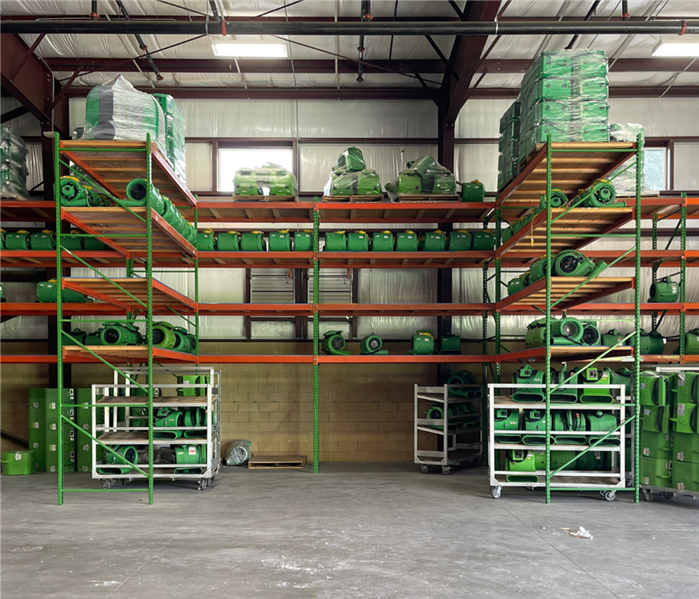 SERVPRO Restoration and Sanitization Equipment ready for dispatch
SERVPRO Restoration and Sanitization Equipment ready for dispatch
Over the past year, Covid-19 restrictions caused many commercial facility building owners and managers to reconsider their cleaning and sanitization programs. With heavy traffic in commercial buildings, germs and pathogens often follow.
Now, many workers and clients expect facility management to maintain high levels of cleanliness in most facilities. This quick guide is meant to provide quick, easy tips to improve your industrial cleaning program. And in case you need expert assistance, SERVPRO of Cherokee County is Here to Help.
Our SERVPRO team is backed by the number 1 name in Property Restoration. We have the expertise and teams to get the job done right every time.
Typical Commercial Cleaning Chemicals
For Hard, Non-Porous Surfaces, cleaning chemicals like Bleach, Alcohol, Pine-Sol, Hydrogen Peroxide, or even Pine-Sol can do the trick. Other options such as Quaternary Ammonia, Phenolics, Iodophores, or Glutaraldehyde containing cleaners, may be just what you need. However, if you have sensitive populations in your commercial property, consider using a Low VOC commercial cleaner. Before implementing any new cleaning program, be sure to read product safety labels and directions for use as some products should never be mixed, can damage certain surfaces, or be harmful at different concentrations.
For Porous Surfaces, specialized cleaning machinery may be needed. However, if you can wash these materials without damaging them, consider utilizing a laundry detergent with a small amount of bleach to clean your porous materials. In other cases, Steam or heat can do the trick in many cases as well.
Sanitizing Machinery
When it comes to commercial sanitizing services, many cleaning chemicals need mechanical assistance as well. For difficult-to-reach locations, or large open spaces, machine support may be needed.
Hydroxyls: These machines produce what are called Hydroxyl Radicals which dismantle the molecular structure of odors, volatile organic compounds, and many airborne pathogens. They emit no odor whatsoever and can be very effective to sanitize large open spaces.
Ozone Machines: These machines work by applying a specialized electric current to air that then creates ozone. This ozone oxidizes and destroys airborne pathogens and sanitizes spaces and porous surfaces very effectively. However, it can also pose a health risk when inhaled in large quantities and emits a distinctive odor.
Due to the potential cost and risks with some of these machines, it may be best to call in professionals for your commercial sanitization needs.
If you believe your business would benefit from Commercial Sanitizing Services, our teams at SERVPRO of Cherokee County ready and available 24/7 to help you be Certified SERVPRO Cleaned.
Call us today at (770) 924-3848
For more on our Commercial Cleaning capabilities, read our blog We Are Cleaning Experts here.
Choosing a Fire Mitigation Company for Rebuild
10/27/2021 (Permalink)
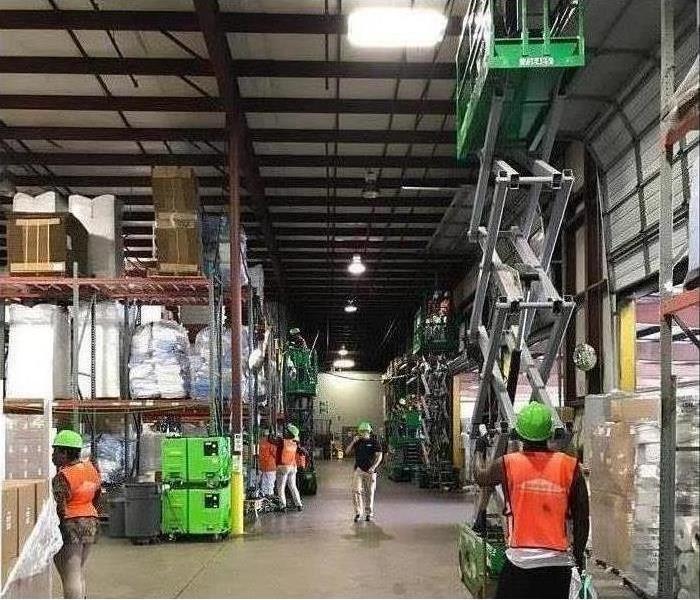 Fire damage cleanup in Holly Springs, GA.
Fire damage cleanup in Holly Springs, GA.
Selecting a Fire Mitigation Company for Reconstruction
When you’re facing fire damage from a conflagration on your property, you aren’t just dealing with fire mitigation. You also have to deal with smoke damage, water damage, and reconstruction, not to mention replacement of any damaged or otherwise unsalvageable equipment. When you find yourself in this situation, you need to choose a fire remediation and mitigation company that can provide all your Holly Springs, GA, services in one place.
Why One Company?
If you choose one company over several, you can consolidate your reconstruction and mitigation efforts in a single easy one-stop shop. Using one company can ensure:
• You only have to deal with one contractor for fire damage, smoke damage, and water damage
• An insurance adjuster only has to handle communication with one company
• You can shorten your restoration timeline with a single company that doesn’t have to coordinate with others
• You can reduce conflicts between different contractors
Attempting to marry all these services across multiple different contractors can cost you more money, as well. Some contractors have minimum base fees for jobs, as well as additional charges that can quickly rack up your bill when multiplied by multiple contractors. Choosing one company can significantly reduce the number of charges you face, and can make billing and payments much easier.
Finding the Right Company
Finding the right company after your business has dealt with fire damage can be difficult. Make sure to research companies in your area to find out what services they offer, and how other customers have rated them. Also, check their certifications for remediation and recovery. A few other critical services you may want to check for are smoke odor cleanup, electronics restoration, and mold damage remediation – yes, mold. If you’ve suffered water damage from burst pipes or firefighters’ efforts, you may have standing water or saturated items that can quickly begin to grow mold.
3 Tips To Avoid the Spread of Mold
7/24/2021 (Permalink)
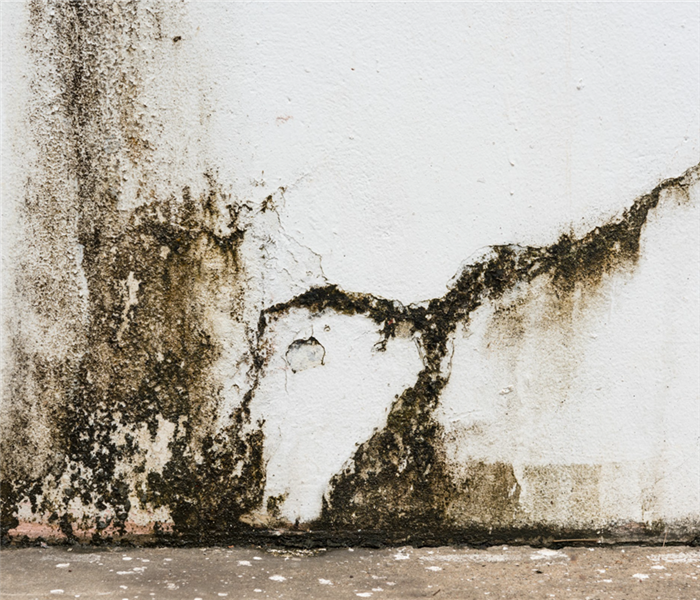 Black mold damage found in Woodstock, GA.
Black mold damage found in Woodstock, GA.
3 Ways to Prevent Mold From Spreading
If you have found black mold damage in your commercial building in Woodstock, GA, you are probably eager to do whatever you can to eradicate it and avoid further harm to the structure. Here are three important tips to remember that, along with help from mold cleanup professionals, will allow you to avoid further destruction down the road.
1. Turn Off Your Water
You likely already know that moisture is a common cause of mold growth. The first step to containing mold is to turn off your water immediately. If you notice any fresh wetness, clean it up with help from a mold remediation company and try to identify the cause as soon as possible. This is important to help prevent the threat of a larger moisture problem. In addition to helping with cleanup, a professional can assist you in figuring out what may be triggering mold growth.
2. Remove Airflow Sources
Airflow can cause the spread of black mold spores. It’s a good idea to promptly turn off the company HVAC system, especially if you believe that mold growth has occurred within it. A remediation company can help you figure out exactly where this growth exists. You will also likely need to have more regular HVAC maintenance checks going forward to make sure that mold on or in your equipment is not a recurring concern.
3. Eliminate Existing Mold
The final tip you need to remember is to get rid of any existing mold in your facility so you do not end up with a larger issue at hand. There are more steps within this process, but quickly disposing of smaller objects that have been affected by mold and enlisting professional help with your overall mold cleanup and restoration in Woodstock, GA, are two good ways to start if you want to make sure that you have the basics covered.
Black mold can spread quickly and cause you to lose valuable commercial assets. Following these tips and getting help from experienced mold remediation specialists will help you protect your property and your peace of mind.
4 Commercial Storm Preparation Tips
6/25/2021 (Permalink)
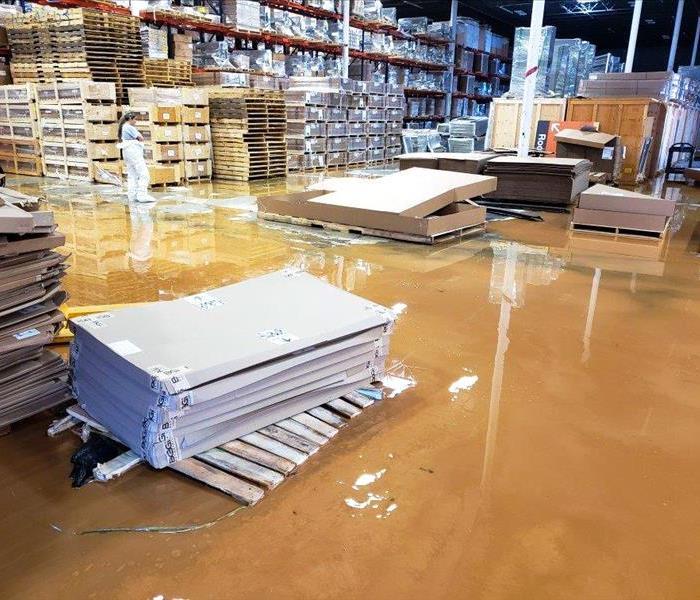 Businesses should have backup plans in place.
Businesses should have backup plans in place.
Storm Preparation Tips
Many businesses are unprepared for storm damage, which can range from the slight presence of floodwater all the way up to a completely flooded building. The four steps below can help owners and occupants of commercial properties limit the extent of damage and get back to work as soon as possible.
1. Check your insurance coverage.
Make sure that your business or commercial property is protected against the most common types of storm damage in your region, including floodwater. This may involve taking additional riders or endorsements on top of a standard business insurance policy.
2. Check stores of emergency supplies.
A commercial property should have a store of sandbags and polyethylene sheeting, hand tools, and possibly a generator and fuel supplies in the event of a storm.
3. Have a data protection plan in place.
Insurers can replace equipment that sustains storm damage, but it is much more difficult to restore corrupted or lost data. Businesses should have data backup plans in place well before a storm and follow protocols to prevent information loss.
4. Come up with plans for evacuation and property safety.
You should have a plan to limit the damage as a storm is approaching. Lift and disconnect appliances, fixtures, and wiring. Shut off the flow of electricity to non-necessary appliances. You should also have a detailed evacuation plan for all occupants and visitors in the building posted in visible areas throughout the structure.
A little planning ahead of time can help you prepare a business in Free Home, GA for a storm. If the property sustains damage, reach out to a commercial water damage or storm damage restoration service as soon as possible. These experts specialize in the removal of floodwater and cleaning, drying, and deodorizing flooded buildings. A quick response can limit the extent of secondary damage resulting from water damage, including mold growth.
How Professionals Can Restore Your Property After a Fire
4/19/2021 (Permalink)
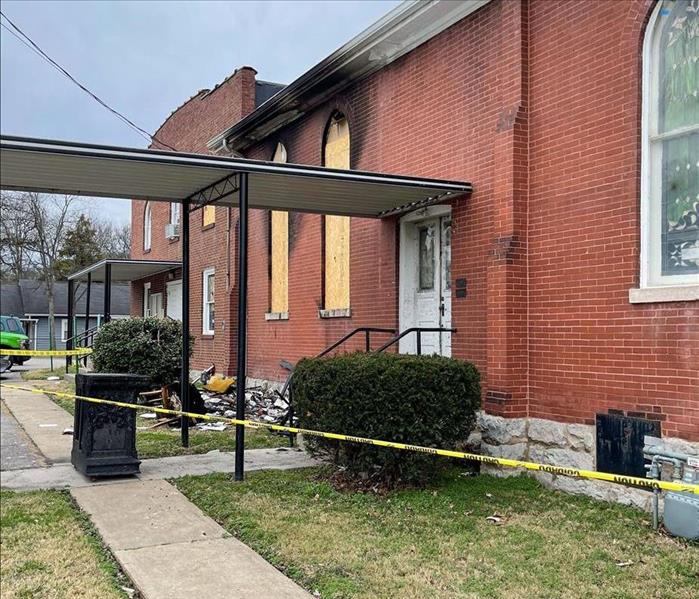 Fire damage in Free Home, GA.
Fire damage in Free Home, GA.
Fires can be incredibly devastating to a commercial or residential property, and unfortunately, an extinguished fire does not signify the finality of its destruction. Along with fire damage comes a host of concerns like flooding generated from the firefighters' relief efforts. Read on to learn how you can pick up the pieces following a fire either at work or home.
What to Do First
If your property experiences flooding or water damage post-fire, there are several steps you can take initially to help make the restoration process simple and straightforward:
- Remove excess water to the best of your ability.
- Elevate furniture from wet rugs and carpets.
- Remove and prop waterlogged cushions and pillows.
- Protect fine art by relocating it to a safe and dry space.
What to Expect Next
Upon their arrival, the professionals will conduct a fire damage assessment. In addition to heat damage, they will evaluate any flooding and water damage caused by a fire hose or other relief efforts. They can carefully inspect smoke odor and soot contamination and give you an idea of how long your restoration process might take.
How They Will Help
After developing a plan of action, professionals in Free Home, GA will board and secure your property to avoid any additional potential for further damage. In terms of flooding and water damage, specialists will use commercial-grade materials to soak up the excess water and fans and dehumidifiers to ensure the property's interior is completely dry.
Further, professional removal of smoke and soot will restore your home or office to its pre-fire, livable state, leaving your ceilings, walls, furniture, floors, and other surfaces clean and disinfected.
Finally, they will complete minor restorations such as drywall repair and new floor installation. At this point, your property will be move-in ready and free from any indication that a fire had ever begun!
Luckily, professionals can assist in restoring your home to its pre-fire, liveable status in no time. Fire damage extends beyond the destruction caused by the heat and flames.
6 Pieces of PPE for Mold Removal
2/2/2021 (Permalink)
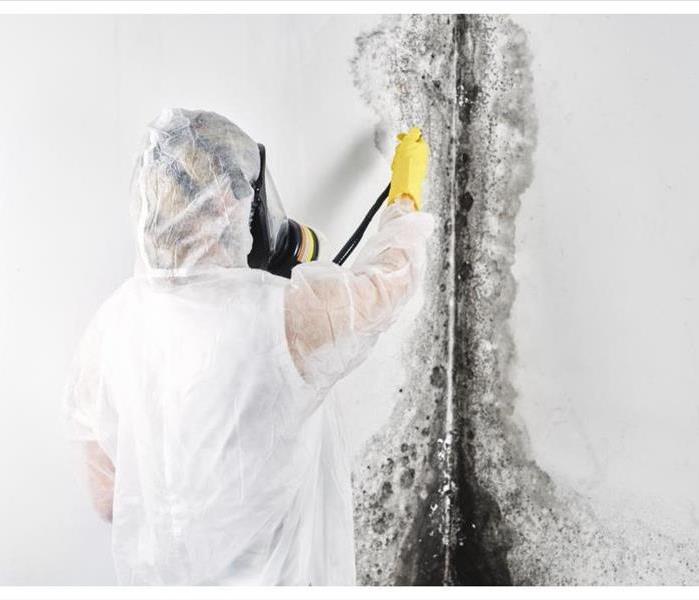 Personal protective equipment is necessary to protect the professionals when they remove mold from a location
Personal protective equipment is necessary to protect the professionals when they remove mold from a location
6 Pieces of PPE for Mold Removal
Personal protective equipment (PPE) is necessary to protect the professionals when they remove mold from a location. This is because mold spores can easily become airborne, inhaled, and travel to other sites. Fortunately, the professionals in Woodstock, GA wear all the PPE they need.
1. Gloves
Disposable latex gloves are necessary to keep the hands free from hazards during the cleanup process. If an individual is allergic to latex, they must wear nitrile or vinyl gloves instead.
2. Hair Covers
A disposable hair cover is going to resemble a shower cap. They prevent mold spores from landing in a worker's hair and being transferred to another location. These covers will be removed before the individual leaves the worksite and replaced with a new one anytime someone enters the contaminated area.
3. Shoe Covers
Shoe covers are disposable booties that go over work boots. They are also necessary to ensure mold is not tracked outside of the worksite. Like hair covers, they will be removed anytime someone leaves the contaminated area and replaced with a fresh pair when they return.
4. Goggles
Safety goggles are worn to protect the eyes. This is important because it keeps the eyes from being scratched or otherwise damaged. They also keep harmful chemicals from splashing into the eyes. These are necessary, and you will see them on any restoration team.
5. Masks
A face mask or respirator is worn to keep mold spores and debris from being inhaled. This is often considered one of the most important pieces of equipment used to protect someone that is removing mold.
6. Tyvek Suits
Some professionals choose to wear disposable Tyvek suits over their regular clothing. This is typical for commercial jobs. It makes it easy for workers to remove their clothing before leaving a site. This prevents them from spreading mold spores to the rest of the building.
A professional remediation company will only undertake a remediation job involving mold growth once they have donned the proper PPE. They will come prepared with all of these safety items. This keeps the workers safe. It also prevents mold spores from traveling to other locations.
3 Tips for Protecting Your Business From Fire Damage
12/28/2020 (Permalink)
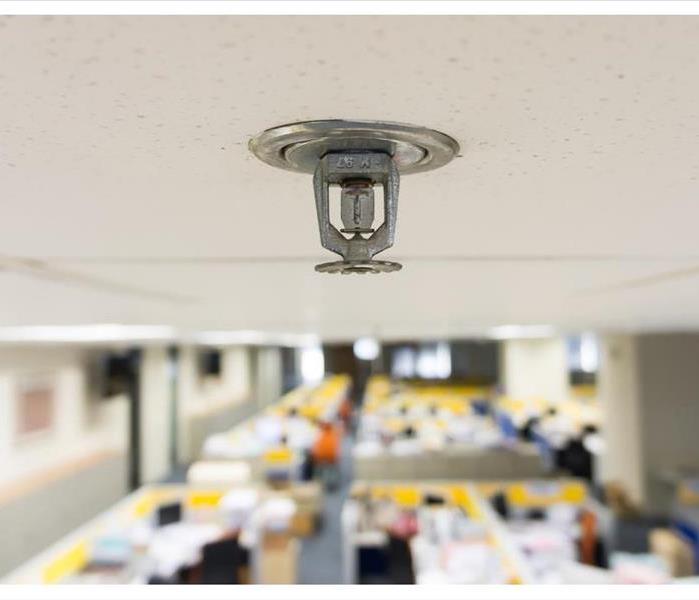 Install a fire sprinkler system in your business
Install a fire sprinkler system in your business
These Three Tips Can Help You Protect Your Business From A Fire
According to The Hartford, about 10% of small businesses suffer a fire loss with an average cost of about $35,000 per claim. Proper fire preparation is the key to reducing the chance of a fire occurring and mitigating the amount of damage.
1. Check Your Fire Extinguishers
Fire extinguishers are one of the most valuable tools for disaster preparation. Fire extinguishers can be used to put out small, localized fires before those fires can spread to other areas. However, to be an effective tool, the extinguishers need to be inspected and maintained according to the fire code in Woodstock, GA. Additionally, employees should be trained on how to properly use them.
2. Install Fire Sprinklers
Another valuable fire preparation tool is a fire suppression or fire sprinkler system. These systems are required by law in some places. Even when not required, they can be worth installing because they can automatically detect and extinguish small fires before those fires can get worse and help mitigate larger fires until the fire department can extinguish them.
3. Keep Your Business Clean
Train your employees to dispose of waste, such as boxes and piles of paper, properly, rather than piling them up on your property where they can provide more fuel for a fire and increase fire damage. Additionally, advise employees not to block walkways, stairways and fire escapes. Clutter in these areas can make it difficult for employees to evacuate during a fire emergency. If your business needs cleaning after a fire event, a fire restoration company can assist you with the process.
Many businesses will experience at least one fire during their time in operation. These fire preparation tips can help you reduce the chances of a fire occurring and mitigate the damage caused by any fires that do start.
What Is Category 1 Water Damage and How Do You Clean It Up?
12/15/2020 (Permalink)
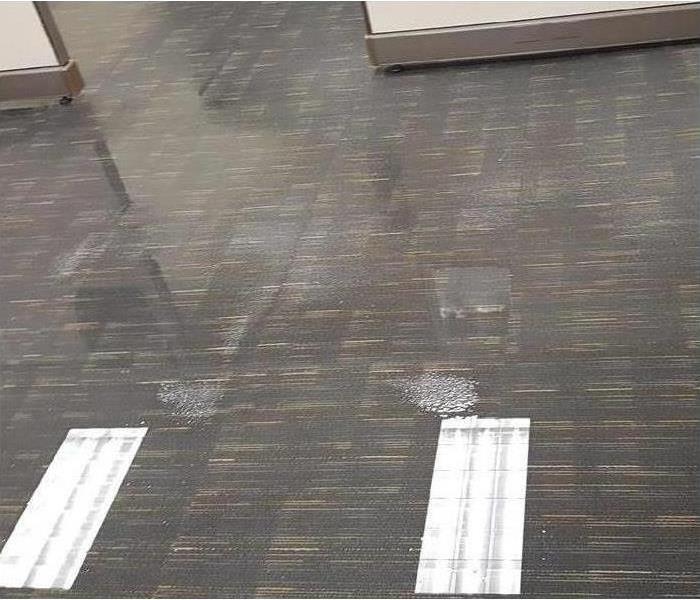 Commercial water damage in Woodstock, GA
Commercial water damage in Woodstock, GA
What Is Category 1 Water Damage?
It is never a good thing to find water damage in your building. It doesn't take a lot of water to ruin building materials and personal belongings. Moisture in your facility can also cause mold growth. There are different levels of water damage, with Category 3 being the most severe. If clean water floods your office, it is considered Category 1 damage. It can still be concerning, so prompt cleanup is essential.
A Deeper Look at Category 1 Water
While the worst type of water damage will come from sewer lines or toilet overflows, Category 1 water will come from clean water sources. These will include the following:
- The main supply line into your building
- Bathroom sink faucets
- Broken pipes
- Overflowing or ruptured water fountains
The Problems This Flooding Can Cause
Category 1 water does not have contamination, so coming into contact with or ingesting in shouldn't pose health risks. Still, the water can damage items in your Woodstock, GA, building such as merchandise, office equipment, workstations and personal items in offices. If you do not remove the water and clean the area soon enough, you may not be able to salvage these materials.
The Cleanup Process
For minor flooding from a broken pipe or other issues, you may be able to remove the water with a wet vacuum. However, more widespread flooding requires the experience and skill of a professional flood cleanup company. A technician will first extract all standing water in your building. To prevent mold and mildew growth, the company will then use high-powered fans to dry the affected area. Sanitizing all surfaces will also ensure that the building is clean and ready for your safe return.
Experiencing a flood in the workplace, even with clean water, can be devastating. Make sure you get in touch with a qualified team of professionals so you can get your office back in working order.
How To Address Leaking Pipes and Minimize Business Loss
11/11/2020 (Permalink)
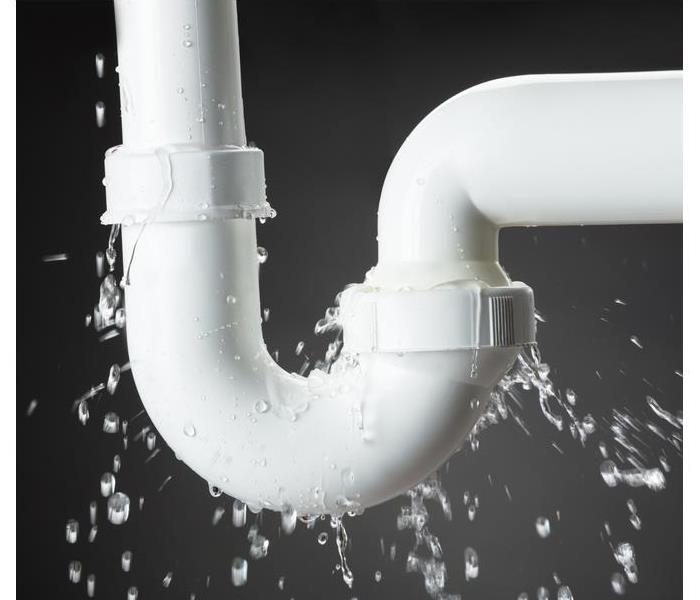 Identify the leak quickly and call professionals to repair the damage
Identify the leak quickly and call professionals to repair the damage
Here Are Four Steps For Handling A Pipe Leak
Flooding can mean big trouble for your business in Acworth, GA if you wait too long to address it. One of the most common causes for business loss is water damage, particularly from leaking and damaged pipes.
If you notice any water leaks in your building, knowing how to respond can severely reduce the damage.
1. Determine the source. Some leaking pipes are easy to spot. Check under sinks in breakrooms, kitchen areas, and bathrooms. Look behind major appliances, such as an ice machine or dishwasher, for signs of accumulating moisture. If you see moisture stains on walls, water may be leaking from a pipe behind the wall. Using a flashlight may make it easier to spot stains and mold.
2. Stop the leak. Once you have identified the source and type of leak, you should stop it and make repairs. Turn off the water to the appropriate area of the building and fix the damaged pipes, enlisting the help of a professional if needed.
3. Remove the water. If you experience flooding from a burst pipe, you should remove any standing water as quickly as possible. Towels can be handy for soaking up excess liquid.
4. Restore the building. When it comes to water, it is best to call water damage restoration specialists. These professionals are specially trained to clean up and restore your business to pre-leak conditions. They use professional equipment to ensure the water is removed, the affected area is thoroughly dried and disinfected, and the impacted materials and structures are repaired or replaced.
If you discover a leak in your building, do not wait for it to get worse. Identify the leak quickly and call professionals to repair the damaged pipes and restore your business. Water damage can intensify quickly, and procrastinating can be a costly mistake.
Why Fire Damage in a Canton Department Store Might Start with the Electrics
8/24/2020 (Permalink)
In larger department stores, it is common for relatively powerful lights to remain on throughout the night. The problem with this is that fluorescent lighting produces lots of heat. If electrical components are not regularly checked for faults, placing this kind of stress on the system can lead to disaster.
We are talking about blown fuses and accidental fires. Luckily, SERVPRO knows just how to deal with commercial fire damage in Canton stores. We want to stress that you should always carry out routine maintenance on electrical systems to avoid fires. However, if the worst does occur, you can call our team for help with repairs.
The Immediate Response
Most department stores have sprinkler systems, so it is rare for fire damage to be extensive. Normally, if a spark has developed, it is behind a wall or in the ceiling, because this is where the electrical wires get housed. So, it is common to see localized patches of damage and individual sections of blackened or soot-stained walls.
The Drying Process
If the sprinklers were active at any point, SERVPRO needs to deal with the excess water first. It must be done very quickly because adding water to sooty deposits can increase their acidity. It might make it tougher for the technicians to remove dirt and grime from carpets and other soft fabrics. We advise the disposal of any items of stock which came into contact with water and soot (particularly clothing).
The Targeted Approach
Assuming that the damage is localized and only a part of the wall requires repairs, SERVPRO carefully cuts away the stained or burned plasterboard. It is necessary for gaining access to the wall cavity, and the material gets replaced later.
Axial fans are an excellent way to direct clean, fresh air into the cavity and flush out smoky and ashy residues. In some cases, a HEPA vacuum may be an effective method of cleaning soot out of smaller spaces, but this depends on the level of access.
Smaller, compact ozone generators or dry foggers are the best options when it comes to chasing bad odors out of the wall cavity. Dry foggers disperse an odor neutralizing chemical, but they do it without adding extra moisture to the environment. It is important when working with electrical components.
The Aesthetic Repairs
Once the wall cavity is clean and deodorized, the technicians can bring in a contractor to add fresh plasterboard. It is painted to match the existing department décor and, possibly, treated with a sealant to prevent lingering soot residues from eating through the top surface.
To find out more about the repair services provided by SERVPRO of Cherokee County, get in touch with our team. We serve businesses in the Canton area and can promise a speedy response. Call us 24/7 at (770) 924-3848 for advice and assistance.
 SERVPRO of Cherokee County is ready for whatever happens! We'll restore your business after any size of property damage.
SERVPRO of Cherokee County is ready for whatever happens! We'll restore your business after any size of property damage.




 24/7 Emergency Service
24/7 Emergency Service











